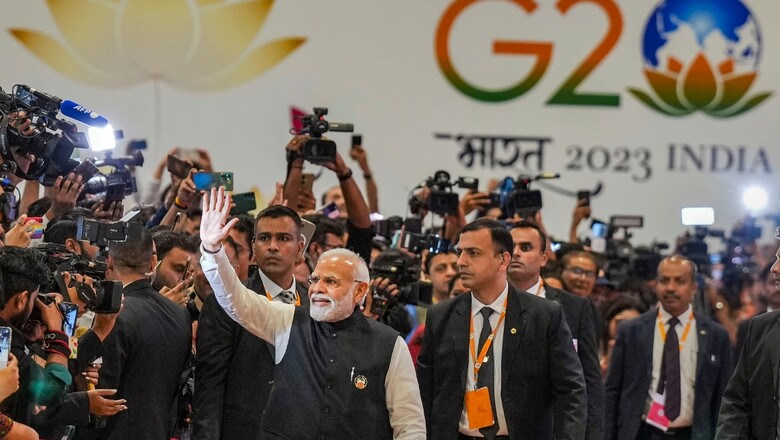
views
The world recently bore witness to India’s grandeur and prowess during the G20 summit held in New Delhi. This monumental event filled every Indian, wherever they may be, with an overwhelming sense of pride and honour. It showcased India as a sovereign powerhouse brimming with unprecedented opportunities.
However, amid the accolades and admiration, some voices of criticism have emerged, levelling accusations against the Modi government for allegedly concealing India’s slums and poverty during the G20 summit, thereby attempting to project a whitewashed image of the nation.
This narrative has gained traction among various circles, including Left-‘liberals’, Communists, Islamists, and the Soros group. While it is crucial to engage in constructive dialogue and critique, it is equally essential to understand the nuances and motivations behind such claims.
First, let’s reflect on the idea of presenting one’s best face to guests. In Hindu culture, guests are revered as ‘Atiti Devo Bhava’, emphasising the duty to serve them regardless of one’s circumstances.
Similarly, in Islam, the concept of ‘Duyoof’ holds immense significance. Prophet Muhammad emphasised the importance of honouring guests, regardless of their social or economic standing. He said, “Whoever believes in God and the Last Day, let him honour his guest as he is entitled.”
The principles of hospitality are deeply ingrained in the fabric of Indian and Islamic cultures, promoting the idea that every able person strives to serve their guests with the utmost respect and care.
Critics must recognise that India is not unique in facing the challenges of poverty and slums. Even in countries as affluent as the United States and Europe, these issues persist.
In America, we witness war veterans begging on the streets, and cities like Detroit, Cleveland, Buffalo, and Camden are infamous for their slums. Drug addiction and homelessness are pressing problems in these nations, and it is not uncommon to see individuals defecating in public areas.
Yet, when it comes to international events or showcasing their nations on the global stage, American and European media, whether right or left, often emphasise the brighter aspects of their skylines and downtown areas.
This is not an attempt to hide their problems but rather a choice to highlight their strengths and achievements, just as any host would want to present their best to guests. It is, therefore, important to differentiate between presenting an idealised image and intentionally concealing issues.
Critics must also be cautious of crossing the line into destructive mudslinging that ultimately serves the agendas of foreign adversaries. The term “useful idiots” comes to mind, describing these individuals who unwittingly assist in advancing the interests of those who seek to undermine their own nation.
In their fervour to criticise the government, it is essential that critics do not unwittingly contribute to a negative portrayal of their own country on the global stage.
It is undeniable that India, like any other country, faces challenges related to poverty and slums. These issues require attention, concerted efforts, and comprehensive solutions.
However, it is equally crucial to recognize the progress that has been made and to acknowledge that the government’s role during international events is to showcase the nation’s strengths and potential rather than to focus solely on its challenges.
The G20 summit provided an opportunity for India to interact with the global community, attract investments, and foster diplomatic relations.
Just as homeowners tidy up their living room before hosting guests, India, as a host nation, took steps to ensure that the event would be a success. This is not a unique or deceptive tactic but rather a diplomatic norm followed by nations worldwide.
Moreover, portraying a negative image of India on the international stage can have far-reaching consequences. It can deter foreign investments, hinder tourism, and damage diplomatic relations.
In a globalised world, where countries compete for resources, partnerships, and investments, projecting a positive image becomes a strategic imperative.
Opposition of the Modi government should continue to scrutinise its policies, advocate for social and economic reforms, but the criticism should be done in a positive way, that should never sabotage the image of their own country internationally.
However, they should also recognise that criticising the government’s approach to international events should not be conflated with addressing domestic issues. These are separate matters, each requiring a distinct approach.
To sum up, the critique surrounding the G20 summit and the depiction of India’s slums and poverty must be viewed within a broader perspective. India, like any other nation, possesses the right to present its most favourable image on the global stage during international gatherings.
This approach does not diminish the significance of addressing domestic challenges; rather, it recognises the pragmatic stance adopted by governments worldwide.
While constructive criticism remains crucial, it should refrain from crossing the line into destructive mudslinging or inadvertently serving foreign interests.
India’s involvement in international events should serve as an avenue for progress, diplomacy, and the showcasing of its potential. It should not be misconstrued as an attempt to conceal its challenges but rather as an aspiration to present itself in the best possible light.
The author is a Saudi-based Indian national. He is Director of Milli Chronicle Media London. He holds a Master degree in Artificial Intelligence and Machine Learning (AI-ML) from Liverpool John Moore University. He did a certificate program in Counterterrorism from the University of Leiden, Netherlands. He tweets under @ZahackTanvir. Views expressed in the above piece are personal and solely that of the author. They do not necessarily reflect News18’s views.

















Comments
0 comment